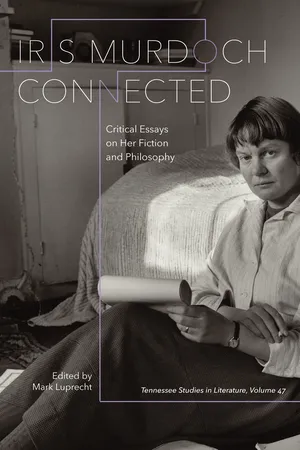
- 233 pages
- English
- PDF
- Available on iOS & Android
eBook - PDF
About this book
This volume compiles twelve essays that reflect the surging interest in the Irish-born author Iris Murdoch as both a writer and philosopher. Beyond her impressive body of philosophical works, Murdoch produced twenty-six novels, several plays, and numerous poems, short stories, and essays during her multifaceted career. The prolific novelist-philosopher has drawn attention from scholars in multiple disciplines, which reflects her range of interests as well as the accessibility of her work from varied perspectives.
The first part of the collection focuses on Murdoch’s literary works and approach to art. Frances White’s opening essay examines the influence of Virginia Woolf on Murdoch, while Elaine Morley deals with attention and “unselfing” in the writer’s works. Much can be learned from Murdoch’s letters, as Miles Leeson and Anne Rowe demonstrate in their respective contributions. David James explores Murdoch’s influence on fellow Irish writer John Banville. Finally, Pamela Osborn and Rivka Isaacson offer vastly different perspectives on Murdoch’s fourth novel, The Bell, in the two essays that round out the literature-centric half of the collection.
Part two highlights concepts in and approaches to Murdoch’s philosophical thought. Tony Milligan writes of the meanings of puritanism and truthfulness in Murdoch’s philosophical writings and essays and in her novel A Fairly Honourable Defeat. Julián Jiménez Heffernan’s contribution centers on Murdoch’s confrontation with the notion of contingency. Using the philosophical lens of metaxu, Kate Larson suggests a new approach to Murdoch’s thought by looking at it in relation to that of Simone Weil. Paul Martens locates the similarities of structure in Murdoch’s The Black Prince and Søren Kierkegaard’s Fear and Trembling. Lastly, Matthew Martinuk delves into the affinity of thought between Charles Taylor and Murdoch.
By examining both Murdoch’s influences and those she has influenced, Iris Murdoch Connected constructs complex new understandings of this formidable writer’s vast contributions to literature and philosophy.
The first part of the collection focuses on Murdoch’s literary works and approach to art. Frances White’s opening essay examines the influence of Virginia Woolf on Murdoch, while Elaine Morley deals with attention and “unselfing” in the writer’s works. Much can be learned from Murdoch’s letters, as Miles Leeson and Anne Rowe demonstrate in their respective contributions. David James explores Murdoch’s influence on fellow Irish writer John Banville. Finally, Pamela Osborn and Rivka Isaacson offer vastly different perspectives on Murdoch’s fourth novel, The Bell, in the two essays that round out the literature-centric half of the collection.
Part two highlights concepts in and approaches to Murdoch’s philosophical thought. Tony Milligan writes of the meanings of puritanism and truthfulness in Murdoch’s philosophical writings and essays and in her novel A Fairly Honourable Defeat. Julián Jiménez Heffernan’s contribution centers on Murdoch’s confrontation with the notion of contingency. Using the philosophical lens of metaxu, Kate Larson suggests a new approach to Murdoch’s thought by looking at it in relation to that of Simone Weil. Paul Martens locates the similarities of structure in Murdoch’s The Black Prince and Søren Kierkegaard’s Fear and Trembling. Lastly, Matthew Martinuk delves into the affinity of thought between Charles Taylor and Murdoch.
By examining both Murdoch’s influences and those she has influenced, Iris Murdoch Connected constructs complex new understandings of this formidable writer’s vast contributions to literature and philosophy.
Frequently asked questions
Yes, you can cancel anytime from the Subscription tab in your account settings on the Perlego website. Your subscription will stay active until the end of your current billing period. Learn how to cancel your subscription.
No, books cannot be downloaded as external files, such as PDFs, for use outside of Perlego. However, you can download books within the Perlego app for offline reading on mobile or tablet. Learn more here.
Perlego offers two plans: Essential and Complete
- Essential is ideal for learners and professionals who enjoy exploring a wide range of subjects. Access the Essential Library with 800,000+ trusted titles and best-sellers across business, personal growth, and the humanities. Includes unlimited reading time and Standard Read Aloud voice.
- Complete: Perfect for advanced learners and researchers needing full, unrestricted access. Unlock 1.4M+ books across hundreds of subjects, including academic and specialized titles. The Complete Plan also includes advanced features like Premium Read Aloud and Research Assistant.
We are an online textbook subscription service, where you can get access to an entire online library for less than the price of a single book per month. With over 1 million books across 1000+ topics, we’ve got you covered! Learn more here.
Look out for the read-aloud symbol on your next book to see if you can listen to it. The read-aloud tool reads text aloud for you, highlighting the text as it is being read. You can pause it, speed it up and slow it down. Learn more here.
Yes! You can use the Perlego app on both iOS or Android devices to read anytime, anywhere — even offline. Perfect for commutes or when you’re on the go.
Please note we cannot support devices running on iOS 13 and Android 7 or earlier. Learn more about using the app.
Please note we cannot support devices running on iOS 13 and Android 7 or earlier. Learn more about using the app.
Yes, you can access Iris Murdoch Connected by Mark Luprecht in PDF and/or ePUB format, as well as other popular books in Literature & English Literary Criticism. We have over one million books available in our catalogue for you to explore.
Information
Table of contents
- Contents
- Acknowledgments
- Introduction (Mark Luprecht)
- Part 1. Essays on Iris Murdoch’s Literary Works and Approach to Art
- Part 2. Essays on Iris Murdoch’s Philosophy
- Contributors
- Index